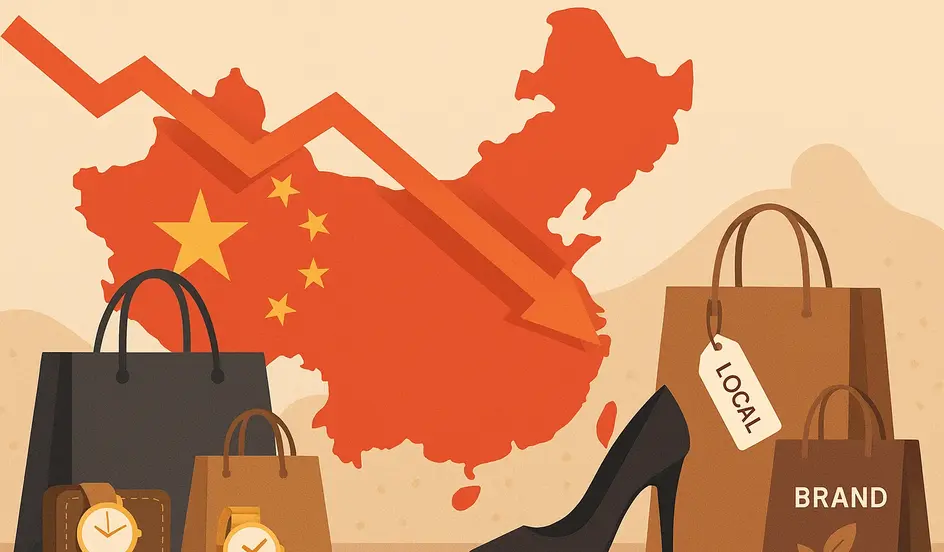Luxury Goods Market China: A $380B Industry Faces Unprecedented Collapse
The luxury goods market China has long been a powerhouse, driving global sales and shaping trends for the world’s most prestigious brands. However, recent data reveals a dramatic downturn, with the $380 billion industry losing an estimated 50 million consumers almost overnight. This seismic shift is not only reshaping the luxury landscape but also forcing both international and local players to rethink their strategies. In this comprehensive analysis, we explore the causes behind the luxury goods market decline, the evolving behavior of Chinese consumers, and the rise of local luxury brands.
Understanding the Luxury Goods Market Decline in China
For years, China’s burgeoning middle class and affluent youth fueled double-digit growth for luxury brands. Yet, 2024 saw a sharp reversal. According to McKinsey & Company, luxury sales in China dropped by over 20% year-on-year, with European giants like LVMH and Kering reporting significant stock declines. The luxury goods market China is now grappling with a perfect storm: economic slowdown, shifting consumer priorities, and a new wave of cultural nationalism.
China Consumer Behavior Shift: From Status to Substance
Chinese consumers, especially the younger generation, are re-evaluating their relationship with luxury. The focus keyphrase, luxury goods market China, is now associated with a more discerning, value-driven audience. Instead of conspicuous consumption, there’s a growing preference for quiet luxury—understated, high-quality products that reflect personal values rather than social status. This shift is further amplified by the rise of local brands that resonate with national pride and cultural identity.
Youth Unemployment and Its Impact on Luxury Spending
One of the most significant factors behind the luxury goods market China downturn is the surge in youth unemployment. With jobless rates among urban youth reaching record highs, discretionary spending on luxury items has plummeted. Many young professionals are prioritizing savings and career stability over high-end purchases.
Luxury Goods Market Collapses in China
The $380B luxury industry has lost 50 million consumers amid rising competition from local brands. Companies looking to pivot or expand globally need resilient workforces. Post your job on WhatJobs today and tap into global talent equipped for changing markets — free for 30 days.
Post a Job Free for 30 Days →The Rise of Local Luxury Brands
As international brands struggle, homegrown labels are thriving. Chinese luxury brands like Atelier Yuen are capturing market share by blending traditional craftsmanship with modern design. These brands appeal to a sense of cultural nationalism and offer products tailored to local tastes. The luxury goods market China is witnessing a renaissance of indigenous creativity, challenging the dominance of European houses.
Case Study: Atelier Yuen’s Disruptive Approach
Atelier Yuen, a Shanghai-based watchmaker, exemplifies the new wave of Chinese luxury. By leveraging local artisans and sustainable materials, the brand has built a loyal following among young, affluent consumers. Their recent collaboration with digital influencers has further boosted their profile, making them a case study in successful market adaptation.
European Luxury Giants: Stock Decline and Strategic Response
European luxury conglomerates have not been immune to the crisis. LVMH, Kering, and Richemont have all reported double-digit stock declines since the start of 2024. In response, these companies are investing in digital transformation, local collaborations, and exclusive product lines for the Chinese market. The luxury goods market China remains a critical battleground for global brands seeking to regain lost ground.
Quiet Luxury vs Mass Luxury: The New Consumer Divide
The dichotomy between quiet luxury and mass luxury is becoming more pronounced. While mass luxury brands struggle to maintain relevance, niche players focusing on craftsmanship and authenticity are gaining traction. This trend is reshaping the luxury goods market China, with consumers gravitating towards brands that align with their personal values and aspirations.
Cultural Nationalism and Its Influence on Purchasing Decisions
Cultural nationalism is playing a pivotal role in the luxury goods market China. Consumers are increasingly favoring local brands that celebrate Chinese heritage and identity. This shift is not only a response to geopolitical tensions but also a reflection of growing confidence in domestic creativity and innovation.
FAQs: Luxury Goods Market China
What caused the luxury goods market collapse in China?
The collapse was driven by economic slowdown, youth unemployment, and a shift towards local brands and cultural nationalism.
How are Chinese consumers changing their luxury spending habits?
Consumers are moving from conspicuous consumption to quiet luxury, valuing quality and cultural relevance over status.
What is the impact of youth unemployment on the luxury goods market China?
High youth unemployment has reduced disposable income, leading to decreased luxury spending among young professionals.
Which local brands are rising in the luxury goods market China?
Brands like Atelier Yuen are gaining popularity by blending traditional craftsmanship with modern design and cultural pride.
How are European luxury giants responding to the market decline?
They are investing in digital transformation, local collaborations, and exclusive product lines tailored for Chinese consumers.
A Luxury Industry Professional’s Perspective
Li Wei, a senior marketing manager at a leading European luxury brand, shares her experience: “The luxury goods market China has changed dramatically in the past year. We’ve had to pivot our strategy, focusing more on digital engagement and partnerships with local influencers. The rise of local brands like Atelier Yuen has forced us to innovate and adapt quickly. While the challenges are significant, I believe this is an opportunity for the industry to become more resilient and customer-centric.”




